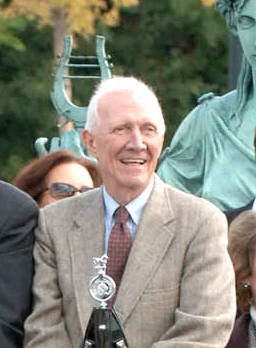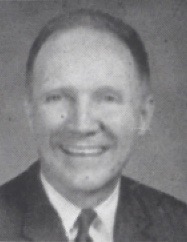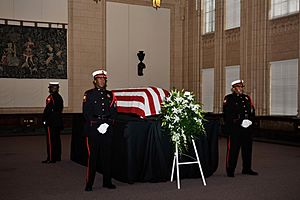Rodney Mims Cook Sr. facts for kids
Quick facts for kids
Rodney Mims Cook Sr.
|
|
|---|---|
 |
|
| Member of the Georgia House of Representatives from the 123rd – Post-1 district |
|
| In office 1966–1968 |
|
| Member of the Georgia House of Representatives from the 95th – Post-1 district |
|
| In office 1969–1973 |
|
| Personal details | |
| Born | March 23, 1924 Atlanta, Georgia, U.S. |
| Died | January 13, 2013 (aged 88) Atlanta, Georgia, U.S. |
| Nationality | American |
| Political party | Republican |
| Spouses | Bettijo Hogan Lane Young (m. 2003) Sidney Adamson (m. 1970s–2002) |
| Children | 3 |
| Parents | James Leslie Cook Bess Mims Cook |
| Residences | Atlanta, Georgia, U.S. |
| Alma mater | Washington and Lee University (BA) |
Rodney Mims Cook (March 23, 1924 – January 13, 2013) was an important public figure from Georgia. He served for more than 20 years. He was a city council member (called an alderman) in Atlanta. He was also a member of the Georgia House of Representatives.
Cook was one of the first Republican officials elected in Georgia. This was after a period called Reconstruction. For some years, he held two jobs at once. He was an Atlanta alderman and a state representative. A law was later passed to stop people from holding two such offices.
He worked on many important laws. These included laws about civil rights, city planning (called zoning), and improving city areas (called urban renewal). He also helped with the Atlanta Airport. He worked on the Interstate Highway system and the Atlanta Stadium Authority. This stadium was home to the Atlanta Braves and Atlanta Falcons sports teams. Plaques on these buildings honor his work.
Contents
Early Life and Military Service
Cook was born in Atlanta, Georgia. His parents were James Leslie Cook and Bess Mims Cook. His father owned several men's clothing stores. His mother's family, the Mims, had been important in Georgia for over 200 years. During the American Civil War, their family farm was destroyed. This happened when General William T. Sherman's army marched through Georgia.
Cook went to Washington and Lee University. He graduated with top honors in 1947. His college studies were paused because of World War II. During the war, Cook was a lieutenant in the United States Navy. He served in the Pacific Ocean. His ship, the USS DuPage, was hit by a kamikaze plane. Luckily, he was not hurt.
Starting His Political Journey
After the war, Cook came back to Georgia. He later helped start an insurance company. In 1962, he began his political career. He joined the Atlanta Board of Aldermen. An alderman is like a city council member. He led the Planning and Development Committee. He also worked on the Parks and Zoning Committees until 1970.
In 1965, Cook was elected to the Georgia House of Representatives. He started his term in 1966. He was the first Republican elected from Fulton County to the Georgia House. He stayed in the legislature until 1972. He led a committee on computerized criminal records. He also served on important finance and industry committees.
Cook ran for Mayor of Atlanta in 1969 but did not win. He later became the leader of the Georgia Republican Party. In 1978, he ran for Governor of Georgia. He ran against the Democratic governor, George Busbee. Even though he lost, his campaign helped Republicans. For the first time since Reconstruction, Republicans became the majority in Georgia's group in the United States Congress.
Working for Civil Rights
In 1962, Cook gave a speech at the Georgia State Capitol. He spoke against the "Peyton Wall." This was a barrier built to stop Black people from moving into a white part of Atlanta. After his speech, the KKK burned a cross on his lawn. This happened at his home in Buckhead.
Cook encouraged Atlanta citizens to help improve the city. He fought against rules that treated minority groups unfairly. This was especially true for housing rules. In 1966, he was one of only five white representatives. Out of 205, he voted to allow Julian Bond to join the state legislature. Bond was an African American who had been elected. The legislature had removed Bond because he was against the war. But the United States Supreme Court later put him back in office.
Cook worked closely with Atlanta Mayors William B. Hartsfield and Ivan Allen. He helped bring money from the federal and state governments to Atlanta. This led to a lot of growth in the 1960s and 1970s. He was friends with Martin Luther King Sr., also known as Daddy King. Cook helped keep Atlanta peaceful after the death of Dr. Martin Luther King Jr.. He worked with Mayor Allen and Coca-Cola CEO Robert Woodruff to do this.
Many Atlanta businesses supported Cook's career. This included Mills B. Lane of Citizens and Southern National Bank. Also, James D. Robinson Jr. of the First National Bank of Atlanta. Cook also supported the careers of Paul Coverdell and Newt Gingrich. They later became a U.S. Senator and Speaker of the House. Both men were trusted helpers to Cook.
Cook's official papers are kept at the University of Georgia Libraries.
Family Life
Cook first married Bettijo Hogan Cook. Her family, the Sewells, came to America a long time ago. They arrived in Virginia in 1610. Mr. Cook later married Sidney Adamson in the 1970s. She passed away in 2002. In 2003, he married Lane Young. Their wedding was held at Blenheim Palace.
Rodney Cook had two daughters and one son. His son, Rodney Mims Cook Jr., is the President of the National Monuments Foundation. He also owns the Millennium Gate in Atlanta. His son is currently helping design a memorial in Washington. This memorial will honor John Adams and John Quincy Adams.
Later Years and Legacy
Cook passed away at his home in Atlanta on January 13, 2013. He died due to heart problems. His funeral was held on January 19 at the Millennium Gate and Museum. He was buried in his family's vault.
On January 15, 2013, Cook was honored in the Georgia House of Representatives. A special speech was given by Joe Wilkinson. On January 17, Cook's body was placed in the Gothic City Hall Chamber. He was the only person to receive this honor since Mayor Maynard Jackson. People could visit him at the Alexandra Park Chapel. His coffin was covered with a flag. An Honor Guard from the U.S. Navy, Atlanta Fire Department, and Atlanta Police Department watched over it.
On January 19, 2013, Cook's funeral ceremony took place. Hundreds of people attended. The Very Reverend Sam Candler led the service. Civil Rights leader Ambassador Andrew Young gave a speech. Choirs performed at the ceremony. The Mayor, Fire Chief, and Police Chief sent an Honor Guard. Fire engines and police cars were part of the funeral procession. Cook was laid to rest in the Mims Family vault.
Memorials
A new park in the Vine City neighborhood was named after him. It is called Rodney Cook Sr. Park. In 2014, Atlanta's Downtown Connector was also named for Cook. This is where Interstates 75 and 85 meet. This honor recognized his work as head of the Highway Commission. He helped build the road. It also honored his efforts in civil rights. He worked to bring all Atlanta citizens together. He also helped keep race relations peaceful in Atlanta.
 | Audre Lorde |
 | John Berry Meachum |
 | Ferdinand Lee Barnett |



